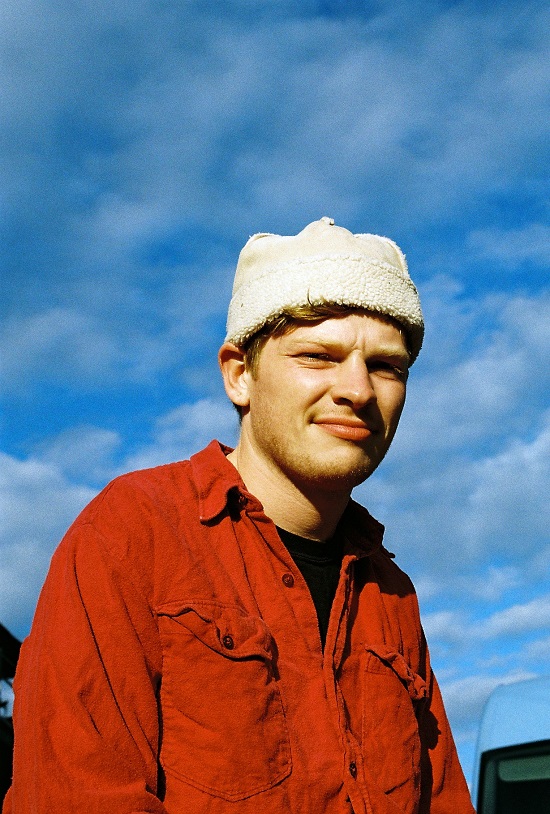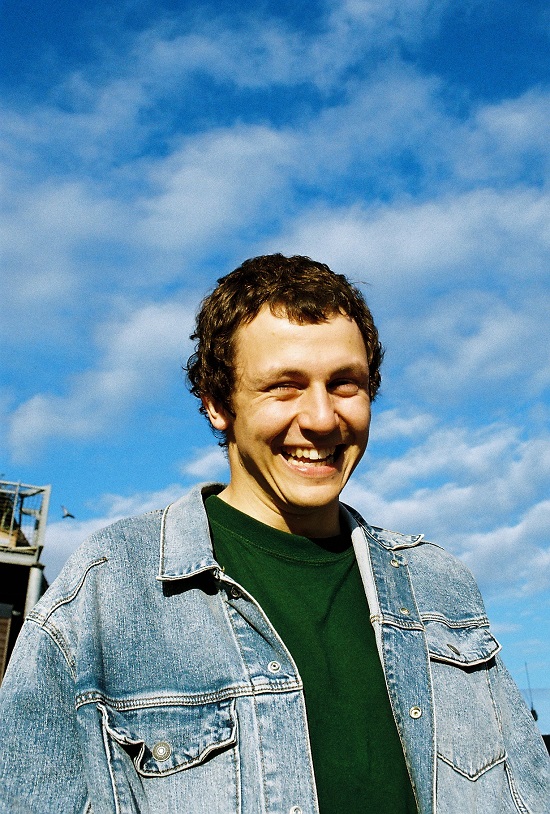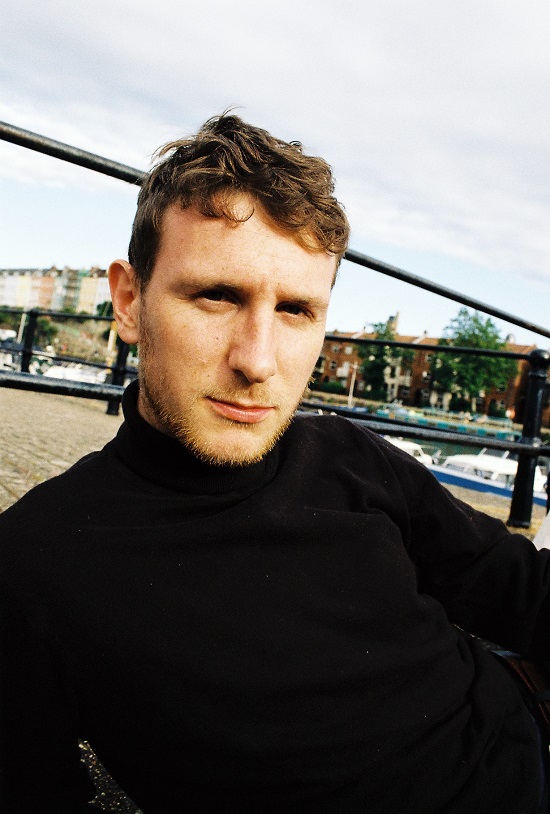tQ finds Squid in London’s 100 Club, before a headline set at the venue’s now-annual ‘All Our Tomorrows’ weekender. Last year, the event hosted Black Midi, Audiobooks, Jockstrap and Black Country, New Road, all of whom are now regularly lauded as the best of that exciting new breed of young British bands you keep hearing so much about. Squid’s status on the line-up, and the air of expectation that hovers over a sell-out crowd of well-dressed teenagers and chin-stroking music industry bods, tells you all you need to know about what they represent – a genuinely exciting new group with the potential to be massive, and part of a supposed ‘scene’ that the press are desperate to try and categorise.
As we sit down with the band – singer and drummer Ollie Judge, guitarist and singer Louis Borlase, guitarist Anton Pearson, brass player and bassist Laurie Nankivell and keyboardist, percussionist and cellist Arthur Leadbetter – they’re having a laugh about the latest attempt. A column in NME has deemed them ‘crank wave’, along with Idles and Fontaines D.C. because they’re all “smart, modern guitar bands with a singer who sounds like someone having a psychotic episode in a debating society.”

Leadbetter is brushing it off. “We’re just getting on with what we’re doing, if someone wants to call us crank wave then well, that’s funny,” he says.
“But our music’s not that angry,” says Judge, a little more defensively.
Whatever your thoughts on a band like Idles, Squid have very little in common with them, other than being white males who play guitars. While Idles are prescriptive and sloganeering, their music drawing on the punk bands that have come before them, Squid look forwards. They first came together as musicians via a jazz night in Brighton, where they went to university, then evolved into a lo-fi kraut-psych outfit for their Neu!-indebted first EP, 2017’s Lino. 2018 single ‘Terrestrial Changeover Blues (2007-2012)’ expanded their sound into wonkier, hazier territory, before their breakout Speedy Wunderground release ‘The Dial’ and it’s follow-up ‘Houseplants’ saw them grow groovier and more angular. Their new EP Town Centre encompasses all of the above.
Everything Squid releases feels like a significant step forwards – one of the most exciting things about following the band is just how rapidly they’re progressing. “There’s been lots of points of transition, a new feeling gig, or coming out of the studio and thinking ‘what we’ve captured there feels new’, although it takes hindsight to see when they were, says Borlase. “At End Of The Road this year we brought a drum machine and did a cover of Robert Wyatt, and that made me really excited that there’s a whole new phase out there.”

Their multifaceted nature might be attributable to their age, somewhere in that weird overlap between latter-stage Millennials and the start of Generation Z. They are all either 24 or 25, some eight years younger than Idles, and are therefore the very first generation of musicians to have grown up with just about any music available to them, easily, cheaply and legally, at almost any time they chose. Spotify was launched when they were 14, the age where music surely makes the most impact. “I can remember going to a gig, then coming home and instantly finding my favourite song from the live show online,” Leadbetter remembers of his teens. Like every band they have predecessors and reference points, but in a way that seems unique to their generation, these reference points could come from any part of an infinite musical spectrum.
“We are the first generation that’s been brought up with the internet in developing periods of our lives,” Nankivell says. “It means that genre is much less definable, it’s not about living in the same city, it’s having something else that draws you together. But it does frustrate me when we’ve been put in the post-punk genre. Post-anything is quite frustrating; it feels like you’re anchored to a movement in the 70s which we don’t have a massive link with.”
“It’s getting harder and harder for us to answer that question we always get asked about what our influences are,” adds Pearson. “Without necessarily even intending to do so, we have a really eclectic mix of things we listen to.”

Their beginnings as a jazz band, although a “really bad” one, as they laughingly put it, may also have something to do with the band’s fast-paced, forward-thinking approach. While students in Brighton, the band played at a night put on every couple of months for a year or two, inviting friends and fellow students to play. There were no set times and no running order, a big list of their names rather than any concrete ‘line-up. “It was a bit of a shock to me when we started playing properly and had people saying ‘right, you’ve got half an hour,” says Leadbetter. “We shared players between each band, I think there was one night where I was in every single act!”
It ended after a hazily-remembered “dispute” between the venue’s owner and the night’s organiser – “It was over a carpet, wasn’t it?” asks Judge. “A square metre of carpet that was or wasn’t supposed to be in the venue?” – and eventually the band moved on to ‘proper’ gigs. Those early days were crucial, however, as a melting pot of their influences and as the groundwork for the way they write, says Leadbetter. “One of the first things we disregarded was a sense of metre, everything was free time, one lead would make us follow a route or chord progression, but again any jazz musician with an ounce of sense would say we’re really, really bad,” he laughs.
It was the first of those ‘transition points’ they were talking about earlier. Each of the fivesome’s palette of influences – and for musicians their age, those palettes are broader than ever – started to properly intermingle within that faux-jazz framework, creating that rapid-shifting storm of a sound. When university ended, Leadbetter, Judge and Nankivett all ended up working in rival Brighton curry houses, Pearson spending a short amount of time as a door to door flower salesman. Pearson and Judge eventually moved to London, while the rest remained in Brighton, meeting in the middle (Croydon) to rehearse. There, when they met Dan Carey, Speedy Wunderground head honcho, came another turning point. They’d come across him reading an interview here on tQ – and his work producing so many of those songs that have gone down as the greatest of this new Gen Z scene’s output, prompted them to get in touch.

They worked with him on ‘The Dial’, what is still the band’s stand out single. “The first thing he wanted to do was speed it up, and then our shows started getting faster, more bouncy,” says Borlase. Their sound began to get more fraught and frantic, another product of their generational experience.
“Moving to London, having to work 9-5, practise, get home at 11, wake up 6 hours later to get to work. It made me sound angry, I personally think moving to London changed the sound a lot,” says Judge. “When I moved to London, I had all these reasons why I thought it was a good idea, then I realised that all of those reasons were what I hated about London. I fucking hated it, I wanted peace and quiet. Leadbetter ensures him not to worry too much, he’s just found a West Country AirBnB with a jacuzzi to record the album. “Well perhaps we’ll write some really poppy love songs now. Pop Songs in the Jacuzzi, Volume 1…” Judge says, cynically.
For all the freedom and open-mindedness the band explore musically, there’s a fraughtness and anxiety to it too, a tightly wound tension between freewheeling fun and spikiness at its heart. “I’ve never had a job where I know when the next bit of money’s going to come,” says Judge. “If I can pay my council tax, I don’t deal very well with that. But then on the other side this is what I’ve always wanted to do. Anxiety has definitely influenced, consciously and subconsciously, our music.”

“If you focus too much on the bigger picture you’re gonna lose sight of what’s getting you there,” offers Leadbetter. “The main thing is your music and your work. That is where we’re going and there are lots of unknowns, but we’re doing so well as people, individually, we’ve got to enjoy it and keep doing it.”
“I have the same financial problems I did when I was an agency worker, so I’m much happier doing this now,” adds Pearson. “It’s all happened so fast in the last twelve months. Sometimes it just feels really silly, like a joke that’s gone too far. We’ve quit our jobs and everything! We’ve done a good job of surrounding ourselves with really nice and good people.”
Squid are an unpredictable band, dealing with the uncertain and ever-shifting road ahead with a sound to match. They move at lightning speed, absorbing cultural bombardment and throwing it back outwards without stopping, twisting and transitioning at every opportunity. They may well end up being absolutely huge. “The biggest shock I’ve had is seeing how many children want things to be signed,” says Pearson. “This nine year old wanted me to sign his book about the Incas. I couldn’t believe it. Another kid came up and said ‘you’re my favourite band!’ That’s the kind of thing that I think is always gonna shock me to the bone…”




